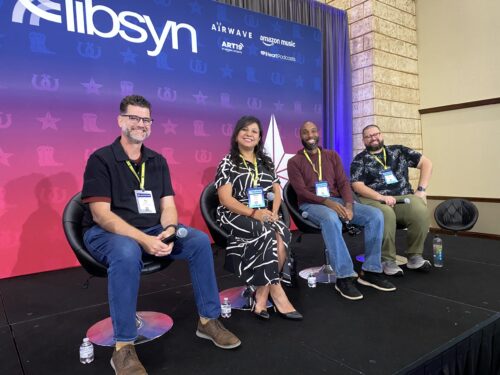
Reflections from Podcast Movement 2025
Walking the halls of Podcast Movement this year, I was struck by a fascinating contradiction. Podcast networks, creators, and advertisers discussed sophisticated monetization strategies, cutting-edge production techniques, and attribution models. Yet when conversations turned to strategic audience research, many went quiet.
After decades of providing strategic research for radio stations, we’ve seen this movie before. The medium changes, but the fundamental truth remains: you can’t optimize what you don’t understand.
The Radio Research Lesson
Radio learned this lesson the hard way. In the early days, programming decisions were often made solely on gut instinct or personal preference. Stations would chase trends, copy competitors, or play what the music director liked. The lucky ones succeeded despite this approach—the rest struggled to build loyal audiences.
Everything changed when radio embraced strategic research, and our founder, Jon Coleman, helped pioneer this effort. Suddenly, programmers could understand not just who was listening, but why they tuned in, what kept them engaged, and what drove them away. Music testing revealed which songs had staying power. Audience research uncovered the emotional needs their stations fulfilled. Competitive analysis showed where opportunities existed in the market.
The result? Radio stations that invested in research consistently outperformed those that didn’t, building stronger audience connections and more valuable advertising propositions.
How Podcast Networks Are Flying Blind
Today’s podcast landscape mirrors early radio in troubling ways. Many networks are making critical decisions based on incomplete information:
Content Development: Shows are greenlit based on host popularity or trending topics, without understanding what specific content resonates with target audiences or why.
Format Optimization: Episode length, release schedules, and show structure are often arbitrary rather than audience-driven.
Host Performance: Networks lack systematic ways to evaluate what makes certain hosts more engaging or how to develop emerging talent.
Competitive Positioning: Without proper research, networks can’t identify white space opportunities or understand their unique value proposition in crowded categories.
Audience Retention: Download and streaming numbers tell you who is consuming, but not why people stay—or more importantly, why they leave.

The “Secrets to YouTube Success” panel at Podcast Movement (L-R: Jay Nachlis/Coleman Insights, Neha Taleja/YouTube, Christopher Colbert/DCP Entertainment, Stephen Robles/Riverside
The Strategic Research Advantage
The podcast networks that embrace strategic research gain powerful advantages:
Impactful and Actionable Audience Intelligence
Moving beyond basic demographics to understand listener motivations, consumption patterns, and emotional connections to content. This intelligence drives smarter editorial decisions and more compelling advertiser stories. Many podcasters utilize valuable first-party data when surveying their own audience. This is valuable, but it’s also “preaching to the choir”, those already in your tent. Finding your target consumers is much harder to do on your own.
Content Optimization at Scale
Rather than relying only on individual host instincts, networks can identify the specific content elements, storytelling approaches, and production techniques that drive engagement across their entire roster.
Talent Development and Evaluation
Systematic research reveals what makes hosts successful, enabling networks to better develop emerging talent and make informed decisions about renewals and expansions.
Market Positioning
Understanding your competitive landscape helps identify underserved audience segments and unique positioning opportunities that generic analytics simply can’t reveal.
Advertiser Value Creation
Research-backed audience insights create more compelling advertiser propositions and support premium pricing strategies.
The Cost of Inaction
While some podcast networks hesitate to invest in research, the cost of not researching is often much higher:
- Shows that could succeed with minor adjustments instead get cancelled
- Talented hosts leave because they’re not given the tools to improve
- Advertising revenue plateaus because the network can’t differentiate its audience
- Competitors who do invest in research gain sustainable advantages
- Content investments are wasted on programming that doesn’t connect with audiences
Research Doesn’t Stifle Creativity—It Amplifies It
One common objection we hear is that research might compromise creative vision. Our experience in radio proves the opposite. The most creative and successful content comes from understanding your audience deeply enough to surprise and entertain them.
Research doesn’t tell creators what to make—it tells them how their audience receives what they make. Armed with these insights, creative teams can take bigger, smarter risks and craft content that truly resonates.
The Podcast Research Opportunity
The podcasting industry is at an inflection point. Early adopters had the luxury of experimenting in an uncrowded market. Today’s landscape demands more sophistication.
I’m concerned about the imbalanced ratio of focus on advertising insights vs. strategic audience research. If the podcast industry truly wants to grow its share of the advertising pie, it must focus on understanding its consumers.
Networks that recognize this shift and invest in strategic research will build sustainable competitive advantages. They’ll create stronger content, develop better talent, and build more valuable relationships with both audiences and advertisers.
The question isn’t whether your network can afford to invest in research. It’s whether you can afford not to.
